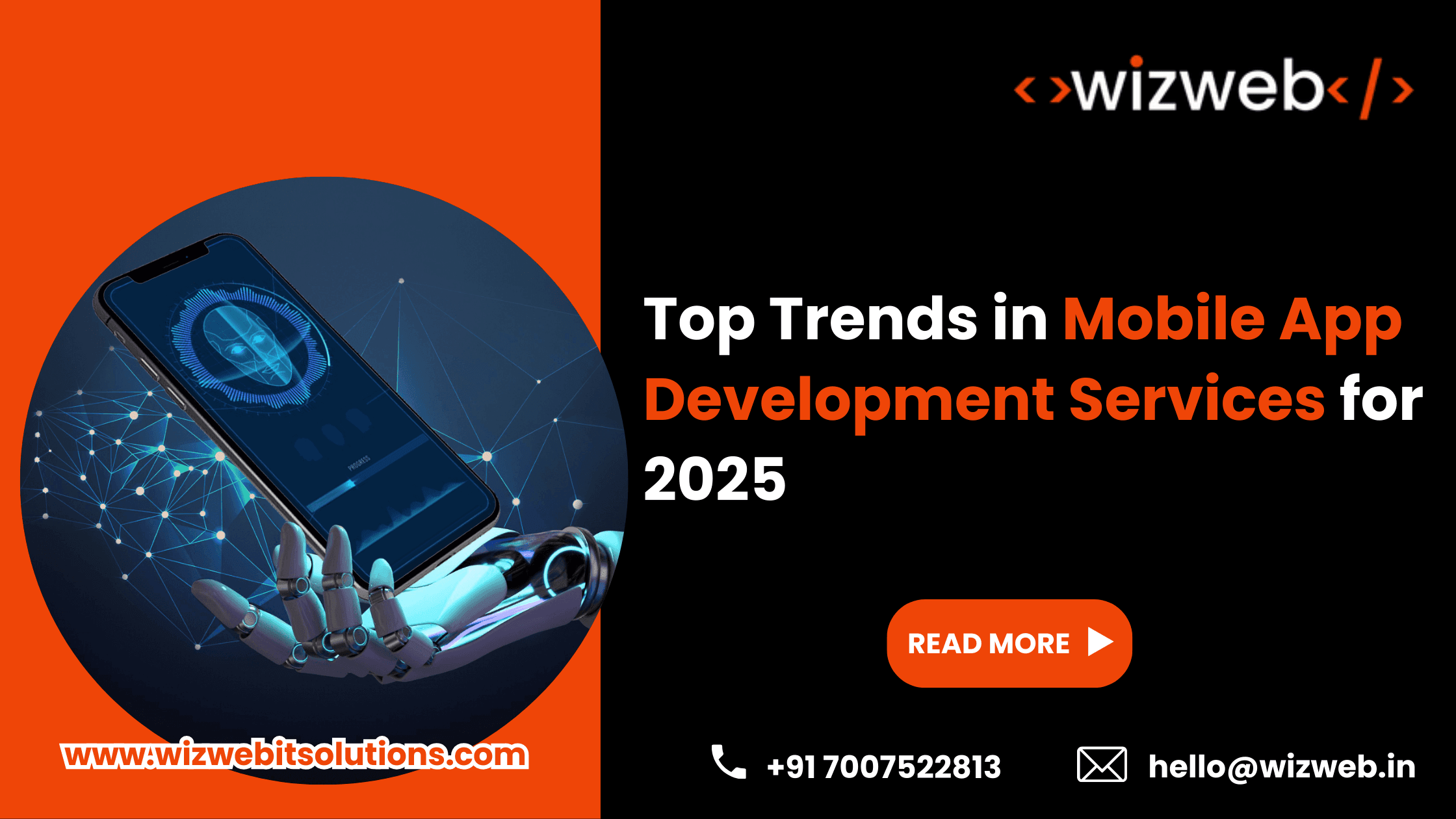Get in Touch
- Phone
+91 700 752 2813
- Email Now
hello@wizweb.in
Office No - 204 A-140, Sector 63 Road Noida, Uttar Pradesh 201301

The world of mobile app development changes quickly as technology advances. As smartphones play an even bigger role in our lives, businesses know how important it is to stay up-to-date in this field. Looking ahead to 2025, developers and companies need to keep up with the latest trends to create apps that are innovative, user-friendly, and helpful.
Following these trends isn’t just a good idea—it’s necessary. By using the newest technologies, businesses can improve how apps work, offer better experiences, and keep users engaged. Whether you’re a business owner with a new app idea or you want to improve your current app, knowing these upcoming trends will give you a strong advantage.
Let’s take a look at the top trends in mobile app development services for 2025!
Technology changes fast, so staying updated with mobile app development services trends is important for success.
Today’s users expect a lot from apps. They want easy-to-use, fast, and helpful apps. If your app doesn’t meet their needs, they’ll quickly move on to something else.
Keeping up with trends can also improve the way your app functions and keep it secure. This boosts user satisfaction and makes your brand more trustworthy.
Remember, your competitors are also working hard to improve their apps. To stay in the game, you need to be aware of what’s new in the market.
AI and machine learning are becoming even more powerful in mobile app development services. These technologies help apps offer personalized experiences by learning from user behavior and preferences.
For example, an app could recommend products or services based on what users have liked or done before. This makes the app more engaging and keeps users coming back.
AI-powered chatbots also help users by providing instant answers to their questions without needing a human to respond.
AR and VR are changing the way users interact with apps. They create immersive, interactive experiences, especially in industries like gaming, shopping, and education.
Imagine trying on clothes in a virtual store or exploring a new place through your phone. AR and VR make these experiences possible, making apps more engaging and fun for users.
PWAs are gaining popularity in mobile app development services because they combine the best features of both web and mobile apps. PWAs load quickly, work offline and don’t take up much space on your phone, making them convenient and user-friendly.
Users don’t have to go to an app store to download PWAs; they can access them directly from their browser. This makes it easier for businesses to reach users quickly.
Chatbots are becoming essential for apps, offering 24/7 support to users. They respond to questions instantly, improving the overall user experience.
With chatbot integration, businesses can serve their customers better, providing real-time help and collecting feedback, which is useful for improving services.
IoT is connecting devices like never before. In 2025, more mobile apps will work with IoT to control smart devices, like thermostats or fitness trackers, right from your phone.
Mobile app development services that focus on IoT will offer users a seamless experience, connecting different devices and making life more convenient.
The future of mobile app development services will focus on enhancing user experience with advanced technologies like AI and ensuring app security remains a priority.
Users are becoming more concerned about data privacy, so developers need to build apps that protect personal information. Additionally, we can expect eco-friendly app development practices to become more common as users look for greener solutions.
Cross-platform compatibility will also be important. Developers will focus on making sure apps work well across all types of devices and systems.
Finally, users may have more influence over how apps evolve, as businesses will listen more closely to feedback to shape future updates.
Mobile app development services are constantly evolving, and staying informed about the latest trends is critical for businesses wanting to stay competitive. Technologies like artificial intelligence, augmented reality, and IoT are transforming the way apps work, making them more personalized and interactive.
Progressive Web Apps are simplifying the way users interact with both web and mobile content, while chatbots are making customer service faster and more efficient. By integrating these innovations, businesses can create apps that better meet modern users’ needs.
As we head into 205, businesses that adopt these trends will be better positioned for success. Keeping up with changes today will ensure a bright future for your mobile app development services.